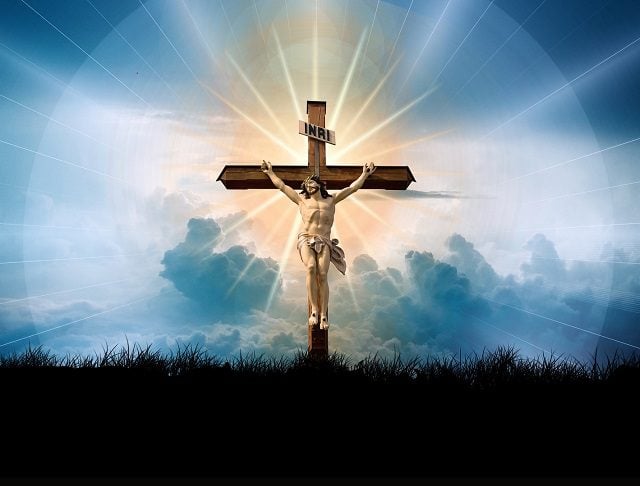
VicQRuiz is a friendly “agnostic/deist” who commented on my 2001 exchange: The “Problem of Good”: Great Dialogue With an Atheist. I compiled those replies and my responses, and now will reply to further comments of his. His words (complete) will be in blue. My older words to which he is responding will be indented.
*****
From your lengthy reply I have selected those comments upon which I think I can best opine. If there is something else you said which you think I really should address, please go right ahead and point it out to me.
I think God, like our (partial) agreement on possible visiting aliens, would “reveal [Him]self publicly to all” and I believe He did so with the Bible and several interactions with human beings throughout history. Why would God not do so? If He exists, and is benevolent, it seems to me self-evident that He would want to make Himself known, for the good of mankind.
Except that God has never to my awareness revealed himself “publicly to all”.
According to the Bible:
Romans 1:19-20 (RSV) For what can be known about God is plain to them, because God has shown it to them. [20] Ever since the creation of the world his invisible nature, namely, his eternal power and deity, has been clearly perceived in the things that have been made. So they are without excuse
That’s revealing at least His existence, and also His power: to all, since they see “the things that have been made.” Other things (such as trinitarianism) are only made apparent through written revelation (the Bible).
We reject the accounts of alien abduction because they are based only on the hearsay evidence of a select group of abductees and because no evidence outside of personal attestation can be detected.
Yes, I agree.
(NB – have you written on the subject of alleged miracles outside of the conventional Christian tradition….for example in the eastern religions, or Joseph Smith’s translation of the plates?)
Not really. Joseph Smith was a fraud, though, and plagiarized a great deal of the King James Version and drew from many other sources for his goofy ancient American history. It’s not new revelation; it’s a fraud.
If someone jumps off a building to kill himself, God (being good and all-powerful) is supposed to make the sidewalk jelly just before he lands, etc. I have argued that this would produce a chaotic universe, in which science wouldn’t even be possible.
I quite agree, provided that when someone falls from a great height and survives largely unhurt (it has happened) the Christian has no reason to conclude that this is because God has stepped into 3D space at precisely the right instant to cushion his fall. Likewise the survivors of calamities in general, they have no more reason to think they are blessed by God than the victims are cursed by him.
Well, you seem to discount all miracles, and apparently do so by prior “category impossibility” (just as David Hume essentially did). I recently wrote about some hard (scientific-type) evidence for miracles continuing into our own time. The atheist I wrote to offered no counter-response whatsoever to deny the existence of those miracles.
The distinction we draw is that God has the right and prerogative to judge human beings (whom He created) in a way that we do not have with each other. Thus, I deny the analogy you attempt here. I’ve written about this many times:
It sounds to me as if you are an adherent of divine command theory. See my final comment below.
I am not, and the Church is not, as briefly explained in an EWTN article. I believe that God (as Creator and Judge) has the inherent prerogative to judge persons and nations. Another article in Catholic Herald states: “Divine Command Theory, while once held by certain medieval theologians, back in the day, is now regarded by Catholic theologians as utterly mistaken, for it leads to the nonsense of believing that God could command things that are inherently unjust.”
I should clarify, too, that Catholics (and many other sorts of Christians) do not believe that Jews and atheists / agnostics (and any other non-Christians) automatically go to hell because they are not Christians / have not accepted Jesus Christ as their Lord and Savior. It’s far more involved than that, and each individual is judged by what they truly know (see Romans 2). Degrees of culpability vary widely. See my papers:
I read the links, but did not see my “degree of culpability” referenced, understandable because I was not the audience for which it was written.
It depends on how much you personally have learned and what you know and what you have accepted or rejected. That would be a long long conversation, and even then, no human being can say with certainty what your eternal destiny will be. We can say at best only that certain beliefs or unrepented sins potentially endanger your soul and eternal destiny.
I do think that if it is not possible for a human being to know if he is bound for heaven or hell, that’s certainly a tick on the ledger for divine hiddenness.
There are many things we don’t know with absolute certainty (in fact, almost all things, if we want to be strictly philosophical). Catholics believe in a very high degree of “moral assurance” of salvation, but not absolute certainty of salvation. We don’t know the future of every (or any) person.
But of course they do not all do so and are not all saved, and that’s because God permitted them the free will to reject Him and His grace, if that is their choice. Thus, in this way, even an omnipotent God can’t get everything He desires, because He has allowed “counter-desires” or a counter-will to make that (virtually, though not intrinsically) impossible. It started right with one of His angels, Lucifer, who rebelled against Him.
Do you think that God has ever intervened on earth in such a way as to override an exercise of free will? If the answer is yes, then I don’t see how you can argue that “God can’t get everything he desires”.
Yes, God has overridden free will at times, in particulars. And it is for the person’s ultimate good, if so. It doesn’t logically follow that He can get all His desires. He can’t, as soon as He allows even one free will decision to dissent against His perfect will. The fall of Satan was the first such thing, as far as I know. That brought in a “counter-will” to God’s will, that God allowed. God desired that Satan didn’t rebel and fall, but nevertheless Satan did. Therefore, “God can’t get everything He desires” in a world where free will is allowed.
From my Catholic perspective (and what I believe is true, period), He wants you and every other non-Catholic to be a Catholic, but you’re not, so God has not gotten everything He wants in that regard (and many others).
(VR) Either morality exists independent of God, or it does not. If it does, then God’s actions may be judged by that morality just as human actions may.
(DA) I agree. I think He passes that test. Technically, our view is that “God is love.” He is the embodiment of it. It’s grounded” in God from our limited perspective. Whatever is good, God is. Whatever God is, is good. God isn’t “subject” to morality. He simply is goodness itself.
He is also all-merciful and all-good. He is love. So what He does, is out of love.
This is the sort of talk from Christians which unfortunately leaves me slack jawed and nearly speechless. “God is the good, God is love.” How can I possibly come to such a conclusion starting from an agnostic point of view?
By God’s revelation of Himself: especially through Jesus Christ. That’s how you do it.
By analogy, I know my wife loves me, and I know that love is an immaterial thing, not a conjunction of atoms and molecules. But I recognize her love only by her actions toward me. If her actions were perceived by me to be often loving and caring, but with a sizable leavening of apparent cruelty and caprice, I could easily conclude differently. I see God in exactly the same way.
Then you are not looking at the right things. You’re not looking at Jesus going through unimaginable suffering for your sake, because He loves you and all human beings and wants you (and all) to be able to spend eternity in heaven with Him. If someone dies for someone else, secular society recognizes that as love. If I rescue a child from a criminal hostage-taker or kidnapper and get shot and killed I’m considered a hero. If I jump in front of a speeding car to help an unknowing baby (or even a dog) and get hit and killed, I’m a hero, because I laid down my life. We say that about soldiers and cops and firefighters.
So there you go. This is what Jesus did. God became man and took on flesh in order to suffer and die for all human beings to potentially be saved, by repenting and believing in His act of redemption.
Instead, you choose to look at the usual “hard cases” in the Old Testament, but they have to do with judgment. They are special cases and specific situations that do not prove that God is evil or capricious.
(VR) Now the thought experiment is this: Suppose an observer from Universe C were to arrive at one of these two universes. Would he be able to determine which one he was in?
(DA) He wouldn’t, unless he had other good reason to believe that God exists.
Yes, I agree that he wouldn’t. This is why I am not convinced that objective morality exists (although I would like it to exist) nor convinced that it is on its own an argument for God.
This is another long, complex discussion, and we already have about ten different sub-discussions going.
We teach them right and wrong to the best of our abilities and (Catholic) lights. They may not always perfectly follow it (in fact I know they do not, because I don’t, either). But if I’ve done my best as a parent and moral teacher, it’s not my fault when they mess up.
But you are a fallible and impatient human, as am I. God is not. (This seems an almost insultingly trivial objection, yet I can’t help but raise it….)
God allows free will, which was the point I was making there.
I would approach those by saying that the laws of science are what they are, and they include natural disasters. If we don’t want God intervening in nature every two seconds, then we have to accept those, and — this being the case –, some people die or get hurt. It’s reality.
That seems to me to argue the existence of a deistic, “wind up the watch and let it go” God. Not so much for hurricanes and earthquakes, but clearly apparent in the existing of something like the Ebola virus.
He lets the natural laws of science operate (which is why science has been so spectacularly successful in obtaining knowledge and allowing wonderful new inventions and help to human beings). But he also ultimately oversees the same laws (which we know from revelation), and sometimes intervenes and deviates from the usual course of nature with miracles, and He reveals Himself (i.e., those things that deism denies).
I perceive you as an adherent of divine command theory, as mentioned above. Do you agree?
No, as explained.
Although I find DCT repugnant and not at all in keeping with my view of what God would have to be,
So do I. We have enough disagreements!
I do commend you for the integrity to take an issue like the massacre of the innocents and deal with it head on.
I deal with it in accord to what the Bible reveals about those things and about God Himself.
It does seen to me that DCT is much more commonly found among Protestants, particularly of the reformed persuasion, than of Catholics.
Yes; and among Muslims.
I’ve heard quite a few Catholic apologists attempt to rationalize and “soften the blow” and frankly I expected you to follow suit. (A couple of examples here and here.
I don’t disagree with anything that I can see in Jimmy Akin’s article. He’s a friend of mine and fellow apologist. But that article doesn’t deal directly with the question of judgment, which is what I dealt with.
Bishop Barron (in your second link) does mention the Amalekites, and he and I might disagree, and that would have to be unpacked. I have disagreed with him on Adam and Eve (twice). Individual bishops are not “magisterial” in and of themselves. They can be wrong in some things.
And let me close this post by asking you at some point (if you have not already done so) to talk about the ranges of beliefs that are found in Catholicism. It’s become increasingly clear to me that the catechism is not an all encompassing guide to exactly what must be believed and what rejected.
There are many areas where Catholics are allowed to disagree with each other, but they are generally lesser or relatively less important matters (such as the exact nature of predestination: Thomism vs. Molinism: I am of the latter camp). Many things that are thought to be “up for grabs” are actually not, and have been determined by the Church to be binding doctrines or dogmas.
The Catechism is the best “popular level” way to determine what those doctrines and dogmas are, and was intended as a “sure norm” for the faith. For most people (non-scholars) who want to determine what we believe and teach, that is the best one-stop source. And it is available online.
If you want to deeply delve into what is believed and how much is required of all Catholics to believe (different levels of authority, whch gets complicated), then you go to Ludwig Ott: Fundamentals of Catholic Dogma (recently revised in English), or (more technically), Denzinger’s Enchiridion Symbolorum. Both in their latest revisions were worked on and partially translated by my good friend, Dr. Robert Fastiggi, a systematic theologian at Sacred Heart Seminary here in Detroit. I just saw him two days ago, in fact, and we talked a bit about Ott.
What is the acceptable spectrum of Catholic belief across:
Historical inerrancy versus allegorical content in the Bible?
That gets into proper interpretation of the Bible, how and when to know what literary genre is being employed, etc. Early Genesis, for example definitely utilizes symbolism (e.g., the trees, the snake / serpent), but there are also actual persons (like Adam and Eve) and events that literally took place in history (including the very fall of mankind, leading to original sin). It’s not always “either/or.” In early chapters in Genesis, symbolism is present, but also literal history as well. One simply has to determine which is which: what genre is being employed, and the intent of the writer.
Almost everyone (including myself) believes that some minor discrepancies (things such as numbers or a botched name) probably crept into the manuscripts we have of the Bible (none the original ones). Orthodox Catholics (who accept all that the Church teaches) do not believe, however, that the Bible teaches theological or moral error. We believe it is inspired and infallible in its purpose.
Natural selection versus guided creation?
Catholics are free to believe in theistic evolution; obviously not materialistic evolution.
Limited atonement versus universalism?
Catholics believe in universal atonement (God’s free offer of mercy for all men to potentially be saved, contingent upon their acceptance or rejection of His grace) but deny universalism (all are in fact saved in the end).
Eternal torment versus annihilation?
We deny annihilationism and hold to the biblical teaching of an eternal hell, in which unrepentant sinners are punished.
It’s been a pleasure and a great mental exercise working through this. “See” you again soon.
My pleasure, too. Thanks for your amiability and inquisitiveness!
***
Photo credit: [Max Pixel / Creative Commons Zero – CC0 license]
***













